|
De Nederlandse dichter Rob Boudestein werd geboren op 31 maart 1947 in Den Haag. Zie ook alle tags voor Rob Boudestein op dit blog.
4 Staatslieden: Kuyper
Een manisch depressieve schriftgeleerde,
geducht om zijn immense diarree
van woorden. Hij schiep VU en ARP
en was de hoofdman der gereformeerden.
De in zijn kring afgodisch haast vereerde
werd Kamerlid, was vier jaar lang premier,
verloor daarna; er kwam geen Kuyper II.
Ook later niet omdat het tij toen keerde.
De krant ‘Het Volk’ onthulde een schandaal.
Door lintjeshandel en een roomse snol,
bekwaam in ‘de perversiteit suceeren’
(bedoeld wordt hier bevrediging, oraal),
was het gedaan met Kuyper’s heldenrol;
hij trok zich terug en zou niet meer regeren.
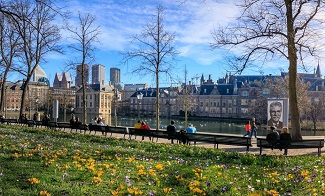
Rob Boudestein (Den Haag, 31 maart 1947)
Den Haag
De Russische essayist, criticus en schrijver Kornej Ivanovitsj Tsjoekovski werd geboren in Sint-Petersburg op 31 maart 1882. Zie ook alle tags voor Kornej Tsjoekovski op dit blog.
Crocodile (Fragment)
(an old tale)
Meets Crocodile:
"Anyone I have not forgotten,
And for each of you
I have gifts in store!
Lev -
Halva,
The monkey -
Gingerbread,
Eagle -
Candy,
The Hippo -
Books,
Buffalo - rod,
The ostrich - pipe,
The elephant - candy,
And the Elephant - gun..."
Only Tohoshinki,
Only Konoshenko
Not presented
Crocodile
Anything.
Cry Totosha with Cocosa:
"Daddy, you are so bad!
Even for stupid Sheep
Do you have candy.
We don't someone else,
We are your children, family,
So why, why
Do we not brought anything?"
Smiled, laughed Crocodile:
"No, cubs, I don't forgot:
Here's a Christmas tree scented, green,
From far from Russia brought,
All wonderful hung with toys,
Gilded nuts, crackers.
That candle we are on the Christmas tree will light,
That song we sing Christmas tree:
"Man you served to kids
Serve now and us and us and us!"
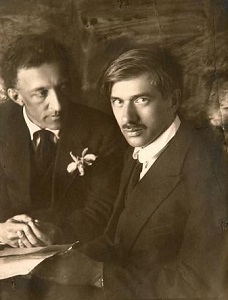
Kornej Tsjoekovski (31 maart 1882 – 28 oktober 1969)
Hier met Alexander Blok (links)
De Schotse dichter, schrijver en journalist Andrew Lang werd geboren op 31 maart 1844 in Selkirk. Zie ook alle tags voor Andrew Lang op dit blog.
Robin Hood And The Monk (Fragment)
In somer when the shawes be sheyne,
And leves be large and longe,
Hit is full mery in feyre foreste
To here the foulys song.
To se the dere draw to the dale,
And leve the hilles hee,
And shadow hem in the leves grene,
Vndur the grene-wode tre.
Hit befell on Whitsontide,
Erly in a may mornyng,
The son vp fayre can shyne,
And the briddis mery can syng.
'This is a mery mornyng,' seid Litulle Johne,
'Be hym that dyed on tre;
A more mery man than I am one
Lyves not in Cristiante.'
'Pluk vp thi hert, my dere mayster,'
Litulle Johne can sey,
'And thynk hit is a fulle fayre tyme
In a mornynge of may.'
'Ze on thynge greves me,' seid Robyne,
'And does my hert mych woo,
That I may not so solem day
To mas nor matyns goo.
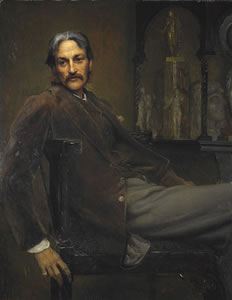
Andrew Lang (31 maart 1844 – 20 juli 1912)
Portret door Sir William Blake Richmond, 1855
De Roemeense dichter en essayist Nichita Stănescu werd geboren op 31 maart 1933 in Ploieşti. Zie ook alle tags voor Nichita Stănescu op dit blog.
Distance
Distance is the cog wheel
on the haunted axle of my hearing,
grinding fine the deadened mind
of that unborn god
waiting to be caught
by the earth's blue speed,
and carrying in a handled urn
the plucked heart - ours,
it's beating, it's heard, it's beating, it's heard,
a sphere in wild growth -
the roads are wet with tears,
memory frail and elastic,
a sling for stones, a gondola
drowned in childlike Venices,
a tooth yanked from the cells with a string -
down the empty socket of Vesuvius. And you exist.
The Hieroglyph
What loneliness
to find no meaning
when there is a meaning
And what loneliness
to be blind in the full light of day, -
and deaf, what loneliness,
amidst the swelling of a song
But not to understand
when there is no meaning,
and to be blind in the middle of the night,
and deaf when silence is complete, -
oh, loneliness within loneliness!
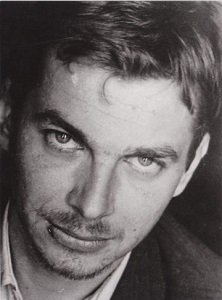
Nichita Stănescu (31 maart 1933 – 13 december 1983)
De Duitse schrijver Hartmut Lange werd geboren op 31 maart 1937 in Berlijn. Zie ook alle tags voor Hartmut Lange op dit blog.
Uit: Das Konzert
„Zuletzt erschien Liebermann, hüstelte verlegen, sprach davon, daß die Philharmonie einer belagerten Festung glich, wollte wieder fort, aber seine Blicke auf Frau Altenschul und die Unmißverständlichkeit, mit der er ihr seinen Arm bot, um sie endlich, es war höchste Zeit, in die gemeinsame Loge zu führen, blieben ohne Erfolg. Sie machte sich Sorgen, ob Lewanski für seinen Auftritt in angemessener Weise gekleidet sein würde, und sie wollte partout, daß er den weißen Seidenschal lose um den Kragen legen und damit seinem Auftritt das allzu Feierliche nehmen sollte.
Über den Rest, versicherte sie, müsse man sich keine Gedanken machen, und sie zitierte als unumstößlichen Beweis eine Nachricht, die ihr Lewanski vor ein paar Tagen hatte zukommen lassen:
»Liebe, verehrte Freundin, denken Sie nicht, ich sei undankbar oder ich hätte es bereut, in Ihrer Nähe wieder seßhaft zu werden. Ich weiß, wie sehr Sie mich lieben, ich bewundere Ihre Hartnäckigkeit, mit der Sie unser aller Schicksal rückgängig machen wollen. Ich spiele Beethoven, immer nur Beethoven, und ich kann Ihnen sagen, daß ich voller Zuversicht bin.«
In der Tür, aber so, daß er mit seinem Rücken die Wand des Korridors fast berührte, stand Schulze-Bethmann.
Er wollte offenbar etwas sagen, fand aber keine Gelegenheit, und man wunderte sich, daß er, der sonst in fast unhöflicher Weise zurückhaltend war, derart im Wege stand, und Liebermann hatte Mühe, an ihm vorbeizukommen, als er mit den Worten: »Gut, dann werde ich das Schauspiel allein genießen« die Garderobe verlassen wollte.
»Wir werden Nachbarn sein«, sagte Schulze-Bethmann, »und ich habe einen Gast mitgebracht, der Sie durchaus nicht erschrecken soll.«
»Was meinen Sie?« fragte Frau Altenschul, die immer bereit war, eine gewisse Gereiztheit, die sie beim Anblick Schulze-Bethmanns überkam, nicht zu unterdrücken.
»Da es, wie ich höre, ein Auferstehungskonzert werden soll«, sagte Schulze-Bethmann, »sollte man auch den Gedanken an eine Versöhnung nicht außer acht lassen.«
»Das ist doch selbstverständlich«, sagte Frau Altenschul.“
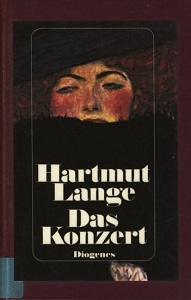
Hartmut Lange (Berlijn, 31 maart 1937)
Cover
De Amerikaanse schrijfster en feministe Marge Piercy werd geboren op 31 maart 1936 in Detroit. Zie ook alle tags voor Marge Piercy op dit blog.
Season of skinny candles
A row of tall skinny candles burns
quickly into the night
air, the shames raised
over the rest
for its hard work.
Darkness rushes in
after the sun sinks
like a bright plug pulled.
Our eyes drown in night
thick as ink pudding.
When even the moon
starves to a sliver
of quicksilver
the little candles poke
holes in the blackness.
A time to eat fat
and oil, a time to gamble
for pennies and gambol.
The seder's order
The songs we join in
are beeswax candles
burning with no smoke
a clean fire licking at the evening
our voices small flames quivering.
The songs string us like beads
on the hour. The ritual is
its own melody that leads us
where we have gone before
and hope to go again, the comfort
of year after year. Order:
we must touch each base
of the haggadah as we pass,
blessing, handwashing,
dipping this and that. Voices
half harmonize on the brukhahs.
Dear faces like a multitude
of moons hang over the table
and the truest brief blessing:
affection and peace that we make.
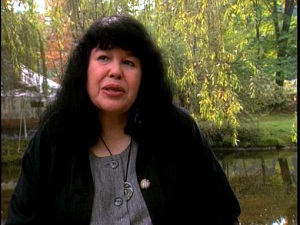
Marge Piercy (Detroit, 31 maart 1936)
Zie voor de schrijvers van de 31e maart ook mijn vorige blog van vandaag.
|



